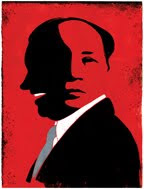
Dubbed the first “CNN Opera,” Nixon in China burst onto the operatic – and political – scene in the late 1980s, and is acclaimed as one of the few late 20th century English-language operas that will likely attain a prominent place in the canon for decades to come. It is a work about four outstanding statesmen and two prominent spouses: Mao and Madame Mao, Chou En-lai, Richard Nixon and Pat Nixon, and Henry Kissinger; but even more, it is a work that depicts one of the astounding political events of the post-WWII era: the visit of Richard Nixon to Beijing and the subsequent softening of the relationship between China and the United States. It is an important work that examines an event that resonates strongly to this day: witness Canadian author Margaret MacMillan’s recent best-selling book, “Nixon in China.”
This contemporary work fits snugly into both Vancouver Opera’s 50th anniversary season and the Vancouver 2010 Olympics and Paralympics. The opera, with its themes of internationalism, of exploring improved relationships between very different nations, and of risk-taking in the name of peace, is emblematic of some of the themes of the Olympics and Paralympics, and it is a piece that will resonate with international visitors as well as our own audiences. With BC’s long and intimate relationship with the people of China, it is especially fitting that our region experiences this seminal work that explores the political and personal relationships of people from very different cultures.
Canada’s role in bringing China fully into the international community is historically significant and continues to be very important to Canadians as well as to the global community. We will be exploring Canada’s involvement with China, and China’s with Canada, in our community engagement series accompanying this production, and we will look at the “triangulation” of Canadian, Chinese and America foreign policy. While Canada’s relationship with China over the years is, of course, markedly different than that of the United States, Nixon’s historic visit changed not just the relationship between China and the United States. As Margaret MacMillan states in her book, “It was an earthquake in the Cold War landscape and meant that the Eastern Bloc no longer stood firm against the West.”
Vancouver Opera’s exciting new production - conceived by Michael Cavanagh, one of Canada’s outstanding stage directors, with sets by Erhard Rom and costumes by Vancouver’s Parvin Mirhady, aided by BC video designer Sean Nieuwenhuis and Vancouver-based choreographer Wen Wei Wang - will be especially tailored for North American opera companies and will create a legacy of dozens of performances of Nixon in China for years to come.
A few sentences about the music. John Adams is, in my opinion, the foremost writer of North American minimalism influenced by romanticism. He is challenging and accessible, driving and soaring. But acclaimed music writer Alex Ross, in his book The Rest is Noise, says it much better:
[Adams’ music is] a stream of familiar sounds arranged in unfamiliar ways….It is present-tense American romanticism…plugging into minimalist processes, swiping sounds from jazz and rock, browsing the files of postwar innovation.
A final thought: why should we care enough about a political event decades old to invest the resources necessary to create this new production of Nixon in China? Don’t political tempests of the day fade through the lens of time, not to mention musical styles? Musically, I believe the work is important and enduring. As for subject, again I turn to Margaret MacMillan:
Of course it matters…
Asia will be at the center of the world again. Yet there will be no peace for Asia or for the world unless those two great Pacific powers, the one supreme today and the other perhaps tomorrow, find ways to work with each other. To understand their relationship we need to go back to 1972, to the moment when it started anew.
~ James W. Wright, General Director

0 Response to "Why Nixon In China?"